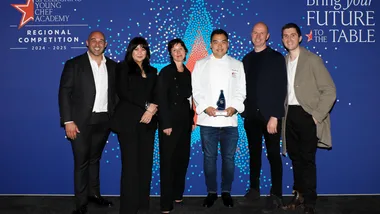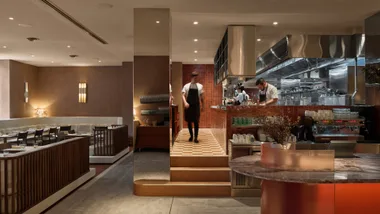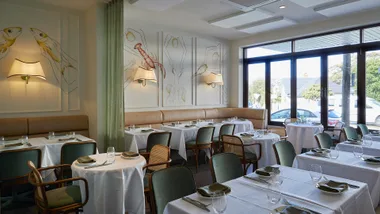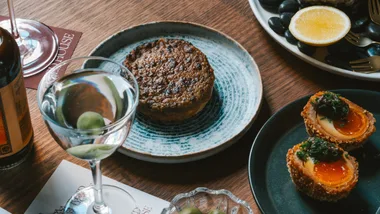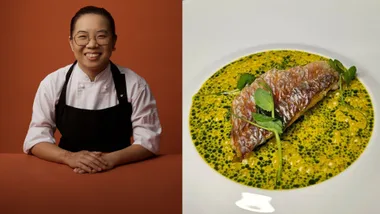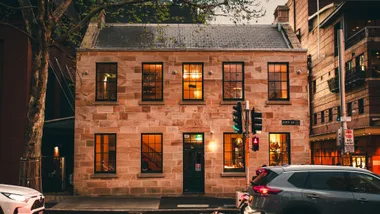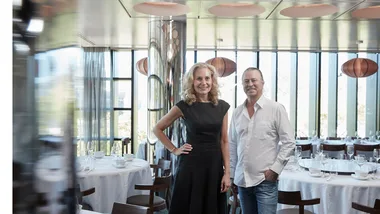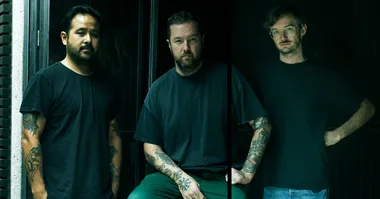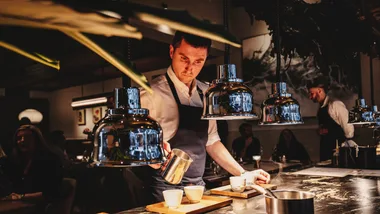“This is so precious to me, it’s like giving away blood from my body,” says Massimo Bottura. The chef is talking about his family’s balsamic vinegar; as he inverts the fine glass bottle half-filled with the decades-old liquid, it’s easy to see why it’s so precious. It runs like syrup, leaving a rich glaze on the glass as it courses to the other end of the vessel. Osteria Francescana, tucked away on the moneyed streets of Modena, pays honour to Emilia-Romagna’s great food products – Parmigiano-Reggiano, prosciutto di Parma and, above all, aceto balsamico – and yet despite its location in this most conservative of cities, it is among Italy’s most progressive restaurants.
Describing Bottura as passionate is like saying the sea is wet. His kitchen is as reliant on art and music as oil and vinegar. The sleek restaurant’s modern interior is decked out with contemporary artworks, and dishes reference everyone from pianist Thelonious Monk to artist Joseph Beuys. Dinner could take in mortadella of the highest order with a line of pistachio dust beside it, or five artisanal parmesans of different ages, each in a different form, ranging from a crisp solid to an airy vapour. And then in the middle of this informed irreverence, Bottura will slip in some tiny, perfect tortellini, nothing tricky about them except their brilliance. At the Melbourne Food & Wine Festival’s masterclass in March, he demonstrated his take on the Magnum ice-cream – a tiny Paddlepop of foie gras parfait, crusted with hazelnuts and almonds, all wrapped around a surprise liquid centre of extra-old balsamic vinegar.
Though Bottura opened his first restaurant in 1987, Osteria Francescana has been where he found his mojo. After struggling for the first five years, business was bolstered by a Michelin star in 2002, and a second followed in 2005. In 2009, the restaurant was ranked at 13 in the World’s 50 Best Restaurants list, the highest of any Italian restaurant, and now Bottura’s name is mentioned in the same breath as that of other gastronauts such as Ferran Adrià, René Redzepi and Heston Blumenthal.
A progressive cook, Bottura argues, has every bit as much interest in the preservation and celebration of tradition and quality artisan food production as a conventional chef. “I believe if you’re doing an avant-garde cuisine, you have to do an avant-garde cuisine with the best products ever, otherwise you don’t have anything in your palette.” Tabloid journalists in Italy have tried to deride Bottura’s work as a harmful travesty of Italian cuisine and its sacred foods, only to have Slow Food and a battalion of traditional producers speak out in the chef’s defence.
Innovation is the foundation of tradition, says Bottura. “A good and intelligent innovation becomes the tradition of the future.” Innovation, he adds, is as important at the producer level as it is in the kitchen. Saving the bianca Modenese milking cow from extinction has been a fixation, while for his famed parmesan five ways, he pressed the Parmigiano consorzio to age its cheeses longer and produce less but better cheese. “Now, on national TV, they’re advertising the cru of this incredible cheese aged 30 months.”
There are two paths open to today’s Italian chefs, Bottura says, both of them right. “One is to follow the score as a musician would; being respectful, buying the right ingredients and following the recipe to produce a good cover version. Others are trying to create their own way, their own music.”
Bottura enchanted Melbourne with his melodies at the masterclass, and was in turn taken with the city himself. “It was an experience for my palate but even better for my mind. I could talk about food for hours but I want to spare a word for the people. I never met such a great mix of gentle, crazy, nice, deep, interested, respectful, different guys. People that make you feel comfortable as soon as you arrive. People that invited me and my young chef de partie to a birthday party, drinking good wine and dancing and hula-hooping in the middle of the street at 2am. People that approach you at the end of the conference saying, ‘It’s 49 years that I’m doing this job and I couldn’t believe I got so emotional again at my age’. This is the beauty of my job.”

